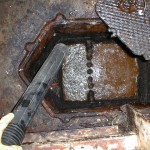 This article will cover commercial grease trap backups. Part of America’s tourism industry includes food. For decades, various food establishments have made history. There are those that have made pizza since the immigrants from Italy arrived. There are pastry makers that have been part of so many family gatherings through the years. Restaurants have been traditional family venues for any kind of event. Caterers have graced so many occasions for so long that no one could ever imagine celebrating without them. Food is historical. The flavors stay because they activate memories that give people that unforgettable feeling. This makes the American food establishments the soul of the country. The food industry can never die because everybody loves and needs food. Even with today’s unstable economy, business-minded people still think of erecting their own food businesses because when properly done, it can haul in many patrons that could bring forth profit.
This article will cover commercial grease trap backups. Part of America’s tourism industry includes food. For decades, various food establishments have made history. There are those that have made pizza since the immigrants from Italy arrived. There are pastry makers that have been part of so many family gatherings through the years. Restaurants have been traditional family venues for any kind of event. Caterers have graced so many occasions for so long that no one could ever imagine celebrating without them. Food is historical. The flavors stay because they activate memories that give people that unforgettable feeling. This makes the American food establishments the soul of the country. The food industry can never die because everybody loves and needs food. Even with today’s unstable economy, business-minded people still think of erecting their own food businesses because when properly done, it can haul in many patrons that could bring forth profit.
As more food establishments try to make their own legacy, the FOG (fats, oils, grease) crisis grows with them. Food establishments contribute greatly to the problem and the federal government has felt the need to do something about it. With this, the grease ordinance was passed. Every food business is mandated to comply by the ordinance so that FOG overflows can be prevented and the wastewater treatment system can be protected. The owners of these businesses are required to have grease interceptors or grease traps within their area. The grease raps should be in ideal condition and should be issued with legal permits. The Department of City Sewer will regularly inspect the traps and the owners should see to it that they are properly cared for.
Commercial kitchens are the main facilities of these food establishments. The kitchen is where the food is prepared. It is made up of various contraptions that enable the staff to perform what they have to do to maintain a smooth system or operations. The grease trap can be installed inside the kitchen if the facility is just a small one. However, of the entire building manufactures food, the grease trap should be installed underground, outside. There have been cases of commercial grease trap backups that have claimed lives or injured people. There have been kitchen workers that have been electrocuted because the grease trap wasn’t maintained and effluent backups occurred. As you may know, commercial kitchen have electrical power sources that are hazardous when wet.
When there is a FOG overflow, the FOG enters the sewer pipes and hardens inside them as they cool down. As more and more FOG spill into the untreated wastewater, it forms a blockage and prevents the wastewater from flowing normally towards the wastewater treatment facility. The effluent goes back to the commercial kitchen where it came from and contaminates the area. It also reaches the living systems around the commercial kitchen and causes pollution and health issues. The food company then faces lawsuits and pays up large fines as punishment for the neglect that they have done. Other food companies don’t want to suffer the same so they see to it that their grease traps are pumped out every week. This is very costly but it keeps the lawyers and billers away.
With vigilance, commercial grease trap backups can be prevented. Those who wash the kitchen equipment and dishes should manually remove the solid wastes and grease materials and collect them in a vessel that can be sealed up and thrown away properly. The drains should also be fitted with meshes and strainers to catch the food and grease particles before they get to the grease trap. Effective cleaners should also be used to care for the grease trap. Bacteria based additives should be the ideal ones to use. These microorganisms eat voraciously and will consume every bit of FOG in the trap. They also eliminate the disarming odors. The environment is also safe from contamination because they have no chemical discharges. Using bacteria will definitely be a smart investment in preventing commercial grease trap backups.